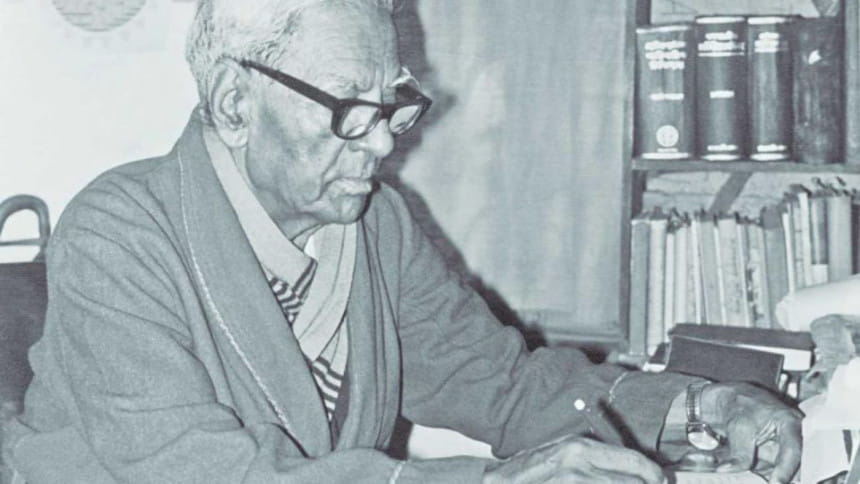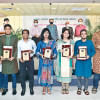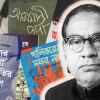A fearless voice of reason

Abul Mansur Ahmad excelled in each of his professions as writer, journalist and politician, and such was his honesty that he worked without pitting one profession against the other.
He started his career as a journalist after the First World War when he was a student at Jagannath College. Around the same time, he also began to write, and a few of his short stories got published in the monthly Shaogat. Encouraged by his friend Abul Kalam Shamsuddin, he joined Maulana Moniruzzaman Islamabadi's weekly Soltan in 1923 as a sub-editor. He also worked for some time at Maulana Akram Khan's weekly Mohammadi. In 1938, he joined the daily Krishak, a progressive and people-oriented newspaper, as its editor. This was the most important time of his journalistic career. But he resigned from that position due to ethical reasons.
Then in 1941, he joined AK Fazlul Huq's daily Navajug, as its editor. But he could not stay there for long as well because of political differences. Afterwards, in 1947, he founded and edited daily Ittehad, published from Kolkata, which went on to become the most prominent Bengali newspaper of that time. Those who were associated with the newspaper later became renowned journalists. It is because of the progressive and non-communal characteristic of this newspaper that it became the target of the Nazimuddin government after 1947. Abul Mansur Ahmad's journalistic career came to an end with the closure of this newspaper. He was one of the pioneers in journalism among the Bengali Muslims of the twentieth century.
Abul Mansur Ahmad had excellent knowledge about the rural Bengali-Muslim society of East Bengal because he had observed them closely, which was reflected in all his writings. Most of his novels and short stories dealt with the social prejudices and religious bigotry of the Bengali-Muslim society. He was very annoyed at the attitude of the madrasa-educated religious bigots, which was reflected in all his writings. His satirical writings such as Aina and Food Conference depicted the social realities and the contemporary political situation of his time. His novels Satya Mithya (1953) and Jiban Khudha (1955) were also based on social problems and injustices.
While portraying the life of rural Muslim society, he took special care to use the local dialects and words used in everyday conversation. Although his use of local dialects was not always appropriate, we can at least get a glimpse of the day-to-day life of the people at that time. He also used many Arabic and Persian words in his short stories and novels. Although later, many Bengali writers including Shawkat Osman used Arabic and Persian words in their writings, Abul Mansur Ahmad was a pioneer in this field.
About his satirical works, Kazi Nazrul Islam wrote in Shaogat: "The stories of Abul Mansur Ahmad represent the political situation of our time. We must admit the fact that no one has tried to write political satire in Bengali literature up until now. Abul Mansur Ahmad is the only writer to have done so in our literature."
Abul Mansur Ahmad was an activist and leader of the non-cooperation movement of Congress, Khilafat movement, Muslim League, Swaraj Party, and the Krishak Praja Party. Besides, he also had the experience of participating in the peasant movements that had taken place in the 1920s and 1930s. He was never a big fan of any of the popular leaders before and after 1947. He not only criticised AK Fazlul Huq, Maulana Bhashani and Huseyn Shaheed Suhrawardy but also was never hesitant in criticising Muhammad Ali Jinnah.
We may not agree with many of his views but we must admit that there was no inconsistency or contradiction in his thoughts—a character trait sorely lacking in many of our progressive Bengali-Muslim intellectuals. While speaking as the chair at the East Pakistan Renaissance Conference, held in 1944, Abul Mansur said: "Religion can transcend geographical boundaries, but culture cannot. Culture has its roots firmly planted in a land. This is what separates the East and West wings of Pakistan. East Pakistan is a distinct geographical entity. And its people are different from other races/peoples in India and even the people in West Pakistan with whom they share a common religion."
Abul Mansur Ahmad believed that East Bengal was not an integral part of Pakistan but a separate entity.
After the Partition of India in 1947, the reactionary and narrow-minded communal leaders of the Muslim League had established their supremacy in East Bengal and a group of hired poets, writers and journalists had joined them. From the very beginning, the progressive-minded intellectuals were shocked and disappointed at the plight of East Bengal. Abul Mansur Ahmad was also disappointed. He was neither ideologically aligned with Delhi-based Congress leaders nor favoured an association with the West Pakistani rulers based in Punjab. He said, "Whatever may be the form of our state—"East Pakistan" or Free "Bangladesh"—we are totally different from West Pakistan or India in terms of language, culture and literature. Our language, culture and literature have distinct characters of their own." (Attokotha).
Abul Mansur Ahmad was a Bengali first, and a Muslim second—and he emerged as a true Bengali-Muslim through a seamless juxtaposition of the two. But this juxtaposition sometimes created a problem too. Upon studying his writings and his life, it becomes clear that he was not a communalist in any way. He was not anti-Indian, unlike many Bengali-Muslim leaders, let alone anti-Hindu. But certain words and phrases that he used as a writer may give a false impression about him. For example, he called East Bengal "Muslim Bangla." Some may object to this grouping of words because of its perceived communal undercurrent (it is said that Zulfikar Ali Bhutto also used it in the 70s). But anyone who read Abul Mansur well enough will know that by "Muslim Bangla," what he meant was a "Muslim-majority Bangla"—with an emphasis on Bangla, or East Bengal, which was at the centre of his attention. He was troubled by the indifference with which Bengal was treated and the obstacles put in the path of its economic and cultural progress.
For all his contributions, Abul Mansur Ahmad deserves a rightful place among the architects of this land that we now call Bangladesh, the idea of which first emerged during the 1905 Partition of Bengal and took a more mature form after the 1947 Partition of India, eventually culminating with the formation of a sovereign state in 1971. In this transformation, he played roles both direct and indirect—big and small.
Abul Mansur Ahmad may appear to be a little conservative sometimes, but he was never reactionary or anti-progress. On the contrary, he strongly campaigned against prejudices, bigotry and all kinds of injustice, inequality, and fundamentalism. He believed in the spirit of justice, democracy and secularism. Learning from his ideas, wisdom and love for humanity can be a recipe for nation-building and continuous social development.
This is an abridged version of the original article, published in Abul Mansur Ahmad Sharakgrantha (2015) and translated by the editorial team of The Daily Star.










Comments